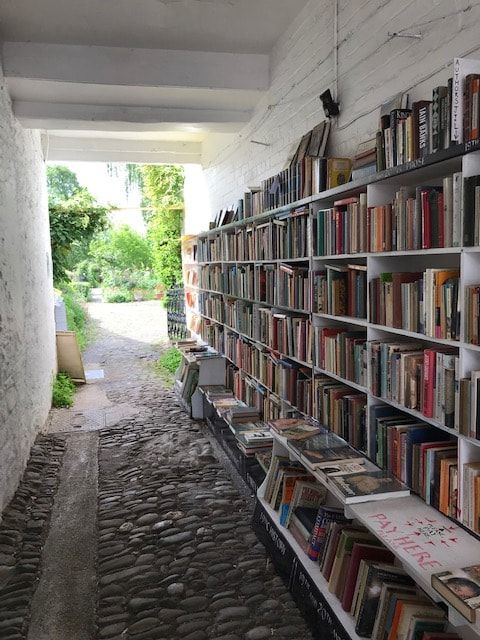By Rosie Angel-Clark, Deputy Wellbeing Editor
We all have a novel, poem or story that brings us comfort. For many, this is a childhood favourite like Harry Potter or The Chronicles of Narnia, books whose familiarity brings back feelings of security. Could literature support our wellbeing in other ways too?
I took an online course entitled ‘Literature and Mental Health: Reading for Wellbeing’ with the University of Warwick which focused on specific benefits of reading and writing literature. Each week concentrated on a different area of mental health – including stress, depression, heartbreak and bereavement, and each had a couple of accompanying texts.

For the sceptics, it was interesting to find out about the use of literature with soldiers suffering from PTSD, or, as it was called in the early twentieth century, shell-shock. You may be familiar with poets like Wilfred Owen and Siegfried Sassoon who are famous for exposing the realities of war and the lasting effects on soldiers’ mental health. Books were given out in military hospitals to injured soldiers as a form of escapism. The idea goes back much further than this, though, to a thirteenth-century Egyptian hospital which prescribed reading the Koran to encourage religious devotion as a medical treatment. The Ancient Greeks identified the link, too, calling their libraries ‘medicine for the soul’.
One reason why reading can be so helpful is that it can help us feel less alone. Knowing that someone else has been through a similar situation can help massively – feeling isolated and misunderstood only magnifies negative emotions. Reading others’ experiences, even if fictional, can encourage you to acknowledge what you are feeling. Looking at a situation from the outside can also help you gain a fresh, more objective perspective on your own situations, and perhaps allow you to see a positive way out.
Emotions are timeless.
There is something comforting about reading a text that may be hundreds of years old and realising that people have always felt the way you currently do. Sometimes, you read something and it’s as if the light has been shone on your own mind – perhaps something you didn’t realise you felt comes to the fore.

Even if you haven’t felt the same as the writer or character, broadening your understanding of what others may be going through can only increase empathy and in the long run aid in relationships.
Perhaps even more effectively than novels, poetry can communicate emotion. It can seem daunting, with its metaphorical language and at times complicated imagery, but the very rhythm can affect its reader. There’s a reason nursery rhymes are comforting to children – the repetitive pattern is soothing, and poems with refrains can also serve this purpose.
Poetry is made more accessible in the form of song lyrics. Again, everyone has had that moment of connection while listening to a song, when your feelings are expressed in someone else’s words. For example, the pained lyrics of ‘Hurt’ (originally by Nine Inch Nails; famously covered by Johnny Cash) may liberate the darkest thoughts of the listener who has been previously afraid to acknowledge them.
Writing, too, can be hugely beneficial. Creating something out of suffering can bring a huge sense of accomplishment. Writing a poem may feel like too much work and perhaps a little melodramatic, but writing down your feelings in any form, such as a letter or list, can help you to recognise them and in so doing begin a process of recovery. Catharsis is an ancient concept that has maintained prominence for a reason – expressing emotion through art forms brings acknowledgement and eventually closure.
Literature is obviously not a cure. If you’re struggling with anxiety, depression or any mental health issues, make sure that you are getting support – reading on your own is not a replacement for counselling, medication, or support from professionals, friends, and family. However, it is worth remembering its power alongside proper medical help to whisk you away in a stressful moment, or to remind you that you are far from alone.

GP Dr Andrew Schuman suggests works of literature on certain themes to support patients’ recovery, either alongside medical treatments or for ongoing support. He is clear in his message:
‘…in the grip of depression, I'm not going to start bringing up poetry. That may be when antidepressants or talking therapies, psychology and counselling, are most relevant. But in the longer-term, also the prevention of further relapse… It's there as a preventative.’
I am an English student and I realise literature may not be for everyone, but I want to emphasise that any reading or writing you do for wellbeing is for you alone, and it can be as far from Shakespeare as you like. Your writing doesn’t have to be award-worthy to be worth putting down on paper. Even if you simply take a few moments to take in the lyrics of your favourite songs, I hope you will be open to finding solace and recognition in the words you read.
A poem for stress relief:
The Lake Isle of Innisfree
I will arise and go now, and go to Innisfree,
And a small cabin build there, of clay and wattles made;
Nine bean-rows will I have there, a hive for the honey-bee,
And live alone in the bee-loud glade.
And I shall have some peace there, for peace comes dropping slow,
Dropping from the veils of the morning to where the cricket sings;
There midnight’s all a glimmer, and noon a purple glow,
And evening full of the linnet’s wings.
I will arise and go now, for always night and day
I hear lake water lapping with low sounds by the shore;
While I stand on the roadway, or on the pavements grey,
I hear it in the deep heart’s core.
W.B. Yeats (1865–1939)
Featured image: Grace Barnes / Epigram
Do you have a favourite piece of writing that has helped you get through tough times? Tell us about it!









